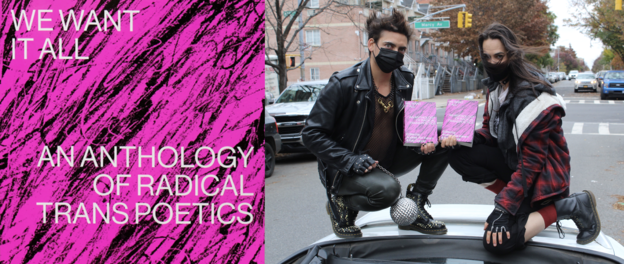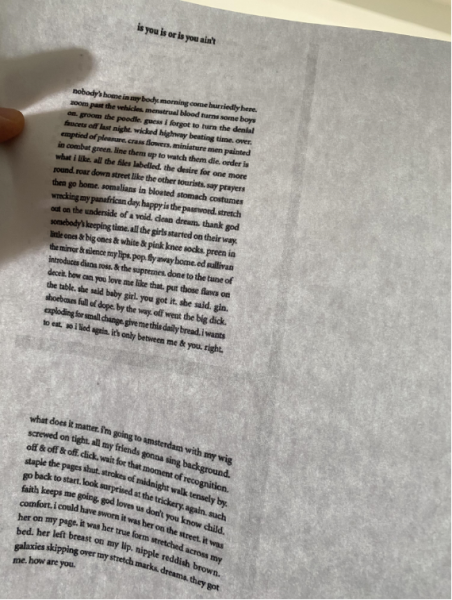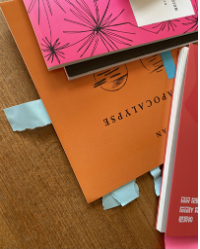Who wouldn’t?
CoReflecting OnWith

We Want it All: An Anthology of Radical Trans Poetics
We Want it All: An Anthology of Radical Trans Poetics
There they are now. — Zack de la Rocha, “We Want it All”
At times we resist to exist — in order to.
And yes, We Want It All: An Anthology of Radical Trans Poetics, coedited by Andrea Abi-Karam and Kay Gabriel, “a collection of formally inventive writing by trans poets against capital and empire.”
And you keep turning the pages and pages of that, like you mean it, as we want it all, and as “we applaud”:
each others’ poor decisions, late for work again goodnight you run up my phone bill I lie for hours in the hot water we toast with our remaining vices and make up about it, mutual spectators in the tragedy of semi-notorious men. Does that endear me to you?
Oui, we understood. We subsist, at least, resubsisting in the world of poetry, poverty almost misread. You say, “hey”; we say, “they,” too, preborn poor in here and out there, inOutside of those inverted commas [ou entre crochets], dreaming of, nay, across “a totally inverted world.”[1] Don’t let citations hold you back, use them like new keys.
“Don’t hold that poetry is a form of, or replaces, political action”:
Poetry isn’t revolutionary practice; poetry provides a way to inhabit revolutionary practice, to ground ourselves in our relations to ourselves and each other, to think about an unevenly miserable world and to spit in its face.[2]
We insist — to exist. To exist as such is and points to a way to exercise one’s existence. Exercise, not excise. Not a typo, not even a single. Insistence is our existence, you might say, and persistence, our exercise. We could be, that is, become, at every f***ing point, a provisionary name, not just provisional, for that same, sex problem à la (br)other Badiou, the philosopher of love (of poetry, so they say, as he says).
One lives through one’s life, like a door here, which, turns out, had to be pulled, not pushed — ha, like everyone is supposed to know all along — or is they? Is you? “Is you is or is you ain’t?” we ask with Akilah Oliver, et al., our friend. I, coming in a little late, didn’t get to meet in person, and yet I am meeting her anyway at her reading housed at PennSound: as she saw in 1999 already, “nobody’s home in my body. morning come hurriedly here. / zoom past the vehicles. menstrual blood turns some boys / on.”
 Akilah Oliver, “is you is or is you ain’t.” A print-out of the source text from “Explode for small change (PoemTalk #104): Akilah Oliver, ‘is you is or is you ain’t.’” Photo by Q, 2021.
Akilah Oliver, “is you is or is you ain’t.” A print-out of the source text from “Explode for small change (PoemTalk #104): Akilah Oliver, ‘is you is or is you ain’t.’” Photo by Q, 2021.
Come on over in whatever vehicles, in French, in Korean, in Chinese, in Electronics, in Transenglish, and so on. Here are some gorgeous scenes of open-ended retrofutural arrival, l’avenir (the future, time to “come”), rendered in commenstrualese. Wouldn’t want to miss them.
Any of them, cuz, again, as Akilah sez,
what does it matter. i’m going to amsterdam with my wig
screwed on tight. all my friends gonna sing background.
“all my friends gonna sing background” … there they are now … as “we want it all.”
I recall hearing this (re)formulation, “eeree on 이리 온,” from a friend, an exquisite Korean poet, Hwang Hegyung 황혜경, who offered a community poetry workshop on that phrase, part of an eco-echo poetics of planetary emotions: “eeree = over here” and “on = come, darling,” retuned by Hegyung, is a very common, if rather quaint, congenial expression that relatively elderly folks in some familial(ized) settings, such as a grandparent, might use, wanting you to come closer. A bit condescending? Yes, sometimes. Then also endearing? Yes, often. With this instantly inviting, transcoding recognition of here-you-are, “you(s)” folded in there, in that speech inter-act, get(s) virtually sheltered. That’s what I’m sayin’. Through such a translogophilopoetic turn to a manifold, polyvocalized “on,” just as an example here — on (English), on as part of on/off (Electronics), one (on, French), come (오다, Korean), warm (温, Chinese) — that seems to turn me on today, too, something else might just be switched on as well.
Again, that’s all I’m sayin’. As I am now transamplifying this gentle compression of social affectivity and kinship, “eeree on, come over here darling,” the tonal inflection of which you might still find condescending, I hear you no worries, I am saying, you, too, “eeree on.” For WE WANT IT ALL with y’all, yes you, a child who “comes up & around / barely visible then slips away — not gone / just out of the frame — then moving.”[3]
One, every one of you, or every other one per se, per-seX is there not because you are let in. You are. You, the first second person, is there, have been there all along. For “I see you always,” says another dear friend of us, NourbeSe Philip, about her “beloved” Tobago, the island to which this Canadian poet says she belongs, the island that has taught her “how to love, how to lose and how to love again”; “Among the many gifts that Zong! has taught me is the insistence that being must be sufficient.” When the simple sorrow of being meets a serene semantics of it, we see it, learn to be with it; and we who “want it all” will be in want of us beyond us, resonating with “us” in the book.

Editors Andrea Abi-Karam (left) and Kay Gabriel (right). Photo: Lix Z.
Again, you just, must, come through, no need to come “out” out even. You’ve already come through, and that’s you. You, this they or that they in all of us, is, resurfaces as an old, new name for “the mass, having come together” that “shakes the room in its feral mosh pit.”[4] The you that comes out of your armpit inhabits this starry persistence of time revolving around itself, forming its own mimacro constellations all the time, and yet many of you, so often, find yourselves forced to become unevenly dispersed and wedged “in the face of transphobic bureaucracy.”[5] More often than not, we (re)entering a “we(e)” bundle of uneven joy get trashed and thrashed by all those gendered bureaus of transhatreduction, the world of the binary.
Part of what I do for a living as a professional deconstructrix on the move is to try and keep unboxing a boxed universe still semisealed by the law of the excluded middle, the law of brother Aristotle, for instance. Particularized articles, not definite, and transbinary practices, not exactly nonbinary, are my thing, and particular forms of transition, themselves in transit, are my business. So, here’s my question that is also (y)ours: how does one imagine another a in the face of a the?
Counter-ponder like a philosopHER at another counter … archive, where you arrive:
Dare a me,
time boiled into submission
[steel persists gaze persists]
Too thick to ignore,
I separate yr lashes
w/ my tongue one at a time,
cleansed by the looking itself
Face 2 face w/ an other animal,
sweating supplants thought[6]
soJust lOOK thru those ashes and ashes and ashes protesting their nowness of STAR (Street Transvestite Action Revolutionaries, established by the legendary activist Sylvia Rivera, 1951–2002) irreducible to nouns; sometimes we so desist — to reXist, as does poetry, which exists almost on nothing and exists virtually in everything. For, again, to recall Andrea and Kay’s point on a point of poetry, its existential eventuation per se, poetry as a kind of speaker spittingly turned on is a conduit for revolutionary change, although it itself “isn’t revolutionary practice. It provides a way to inhabit revolutionary practice, to ground ourselves in our relations to ourselves and each other, to think about an unevenly miserable world and to spit in its face.”
As they continue to write:
We believe that poetry can do things that theory can’t, that poetry leaps into what theory tends towards. We think that poetry conjoins and extends the interventions that trans people make into our lives and bodily presence in the world, which always have an aesthetic dimension. We assert that poetry should be an activity by and for everybody.[7]
I, too, see poetry as “an activity by and for everybody” and in everybody, including Sylvia Rivera, founding president of STAR, in whose foundational assertion of genderqueer transcontemporaneity, namely, that “homosexuals have been since the beginning of the world, since people started being born,” I sense a transyntactic crystallization of queer poetic sensibility.
How does one “start being born” unless they start cognizing the birth per se?
How does one “start being born” unless they start coming into being?
How does one “start being born” unless they start recognizing them as one?
They need them all, all of us — you would need to make transense of it all.
 Photo by Q, 2021.
Photo by Q, 2021.
1. Andrea Abi-Karam and Kay Gabriel, eds., “Making Love and Putting on Obscene Plays and Poetry Outside the Empty Former Prisons,” in We Want it All: An Anthology of Radical Trans Poetics (New York: Nightboat Books, 2020), 2.
2. Abi-Karam and Gabriel, “Making Love,” 2.
3. Bianca Rae Messinger, “THAT MORNING WILL FEEL QUITE LUMINOUS,” in We Want It All, 51.
4. Caelan Ernest, “four perspectives (of the same object),” in We Want It All, 71.
5. Ray Filar, “You’ve heard of Ritalin, now what if I told you governments make bodies into crime scenes for no reason at all,” in We Want It All, 347.